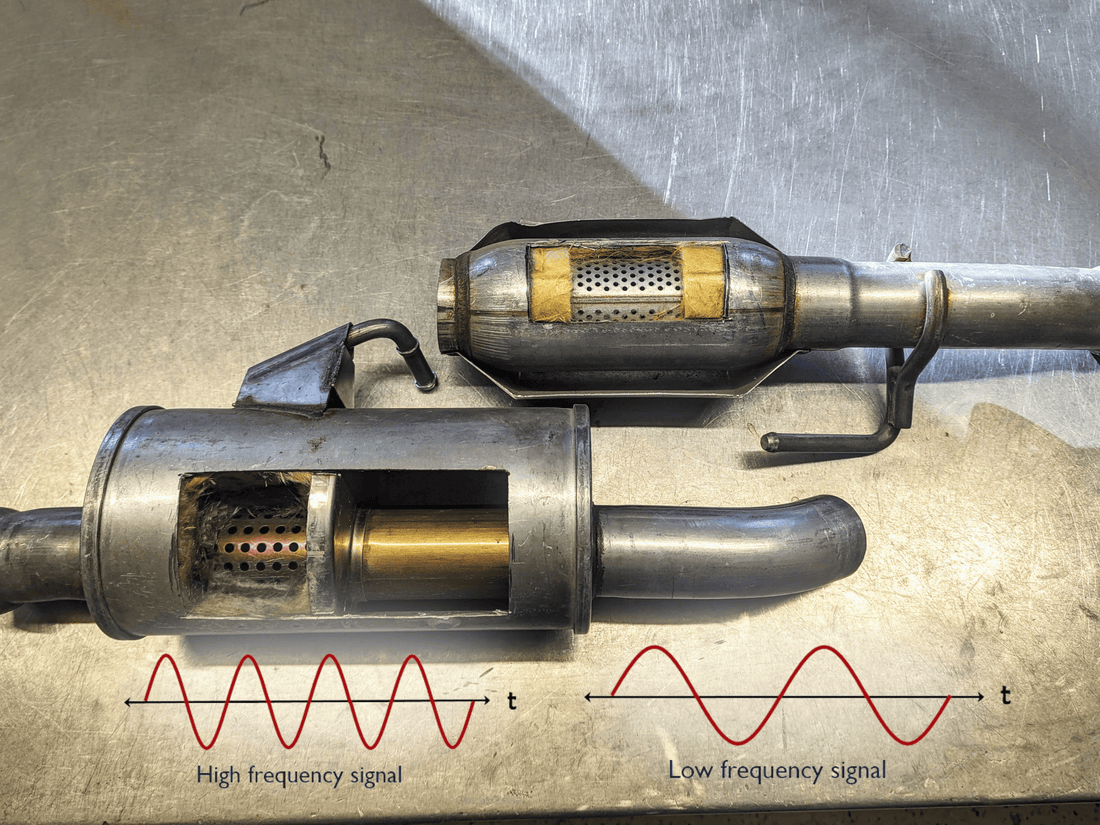Have you ever wondered why your car’s exhaust sounds the way it does? If you’ve noticed a smooth, quieter tone instead of a loud roar, a key player is likely at work: the resonator.
But what does a resonator do on an exhaust system, and why should you care? Understanding this small but important part can change how you experience your ride, from noise levels to engine performance. Keep reading to discover how your exhaust system’s resonator affects your driving and why it might just be the upgrade your vehicle needs.

Credit: johnnysmuffler.com
Resonator Function In Exhaust Systems
A resonator is a key part of a car’s exhaust system. It helps control the sound made by the engine.
The resonator works with the muffler to reduce noise and improve exhaust flow.
How A Resonator Reduces Noise
The resonator changes sound waves inside the exhaust pipe. It cancels out certain noise frequencies.
This makes the engine sound quieter and smoother. It stops loud or harsh noises from coming out.
Improving Exhaust Flow
The resonator helps the exhaust gases move more easily. It reduces backpressure in the system.
Better flow means the engine works more efficiently and can perform better.
Difference Between Resonator And Muffler
The resonator mainly focuses on changing sound waves to reduce noise.
The muffler uses chambers and baffles to block and absorb sound energy.
- Resonator tunes sound frequencies
- Muffler blocks and absorbs noise
- Both work together for quiet exhaust
Signs Of A Bad Resonator
A damaged resonator can cause loud or unusual noises from the exhaust.
Other signs include reduced engine performance and poor fuel efficiency.
- Loud droning or buzzing sounds
- Reduced power during acceleration
- Lower fuel economy
Noise Reduction Mechanism
A resonator helps reduce noise in an exhaust system. It changes sound waves to make the engine quieter.
This part works with other components to control the loudness of the exhaust noise.
Sound Wave Manipulation
The resonator changes sound waves inside the exhaust pipe. It uses chambers and tubes to reflect and cancel sound waves.
- Sound waves enter the resonator chamber.
- Waves bounce and interfere with each other.
- Some sound waves cancel out, reducing noise.
- The remaining sound is softer and less harsh.
Frequency Tuning
Resonators tune the sound frequencies that the exhaust produces. This helps reduce specific loud noises.
| Frequency Range | Effect on Sound |
| Low Frequencies | Reduced rumble and deep noise |
| Mid Frequencies | Smooths engine tone |
| High Frequencies | Softens sharp and harsh sounds |
Enhancing Exhaust Efficiency
A resonator is a key part of the exhaust system in a vehicle. It helps improve how the exhaust gases leave the engine. This makes the engine work better and can reduce noise.
Understanding what a resonator does helps explain how it improves exhaust efficiency. It mainly works by aiding the flow of exhaust gases and lowering back pressure.
Facilitating Exhaust Flow
The resonator smooths the path for exhaust gases. It reduces turbulence inside the exhaust pipe. This allows gases to move faster and more easily out of the system.
- Reduces sound waves that cause noise
- Helps exhaust gases exit smoothly
- Prevents gas buildup in the pipe
- Works with the muffler to control sound
Reducing Back Pressure
Back pressure happens when exhaust gases face resistance leaving the engine. The resonator lowers this pressure by letting gases pass more freely. This helps the engine breathe better.
| Effect | Benefit |
| Lower back pressure | Improves engine power |
| Smoother exhaust flow | Increases fuel efficiency |
| Quieter exhaust noise | Better driving comfort |
Improving Vehicle Performance
A resonator is part of a car’s exhaust system. It helps control the sound and flow of exhaust gases. This part can also improve how well the vehicle runs.
By managing exhaust flow, a resonator can make the engine work better. This can boost power and save fuel.
Boosting Engine Power
The resonator smooths the flow of exhaust gases. This reduces back pressure on the engine. Less back pressure means the engine can push out gases easier.
When exhaust moves freely, the engine breathes better. This helps the engine make more power. It also keeps the engine parts cooler and working well.
- Reduces exhaust back pressure
- Improves engine breathing
- Increases horsepower and torque
Optimizing Fuel Economy
A resonator helps the engine run more efficiently. It balances the exhaust pulses. This balance makes the engine burn fuel better.
When fuel burns well, the car uses less gas. This means better fuel economy and fewer trips to the pump.
- Balances exhaust flow
- Improves fuel combustion
- Reduces fuel consumption
Influence On Exhaust Tone
A resonator is part of a car’s exhaust system. It changes the sound the exhaust makes.
It helps reduce noise or make the sound smoother. This affects how the car sounds when running.
Achieving Desired Sound
The resonator helps shape the exhaust tone to match what the driver wants.
It can lower harsh noises or cancel out certain sound waves, making the tone nicer.
- Reduces high-pitched noises
- Smooths out the exhaust sound
- Can create a deeper or quieter tone
Customizing Vehicle Acoustics
Car owners can change or remove the resonator to get different sounds.
By adjusting the resonator, they control how loud or soft the exhaust sounds.
- Adding a resonator softens loud exhausts
- Removing it makes the sound louder and more aggressive
- Different resonator designs create unique tones

Credit: www.b2fabrication.com
Resonator Vs. Muffler: Key Differences
The exhaust system uses parts like resonators and mufflers to control sound. Both parts help reduce noise but work in different ways.
Understanding how a resonator differs from a muffler helps you know their roles. This guide explains their purpose, design, and effect on performance.
Purpose And Design
A resonator mainly smooths out the sound from the engine. It works with the muffler to create a nicer exhaust tone.
A muffler’s main job is to reduce the loudness of the exhaust noise. It blocks and cancels sound waves to make the car quieter.
- Resonator: Shapes sound by tuning specific frequencies
- Muffler: Cuts overall noise level
- Resonator: Often a straight pipe with chambers inside
- Muffler: Contains baffles and chambers to reduce sound
Impact On Performance
Resonators can improve engine efficiency by reducing backpressure. This helps exhaust gases flow more smoothly.
Mufflers usually create more backpressure than resonators. This can slightly reduce engine power but makes the car quieter.
- Resonators: Often increase exhaust flow and engine sound quality
- Mufflers: Focus on noise reduction and can limit flow
- Using both can balance sound and performance
Choosing The Right Resonator
A resonator helps reduce noise from your car’s exhaust system. Picking the right one improves sound and performance.
Choosing a resonator means thinking about many important factors. This guide will help you select the best fit for your vehicle.
Factors To Consider
Resonators come in different shapes, sizes, and materials. You need to think about these before making a choice.
- Size and Shape:It must fit your exhaust pipe properly.
- Material:Stainless steel lasts longer than aluminized steel.
- Sound Level:Some resonators reduce noise more than others.
- Cost:Find a resonator that fits your budget without losing quality.
Compatibility With Vehicle Models
Not every resonator works for all vehicles. You need to match the resonator to your car’s make and model.
| Vehicle Type | Common Resonator Size | Material Recommendation |
| Sedan | 2.5 inches | Aluminized Steel |
| SUV | 3 inches | Stainless Steel |
| Truck | 3 to 4 inches | Stainless Steel |
| Sports Car | 2.5 to 3 inches | Lightweight Stainless Steel |

Credit: www.carparts.com
Frequently Asked Questions
What Is The Primary Function Of A Resonator In Exhaust?
A resonator mainly reduces exhaust noise by canceling specific sound frequencies. It works with the muffler to create a quieter exhaust system. This improves driving comfort without affecting engine performance or emissions.
How Does A Resonator Affect Exhaust Sound Quality?
A resonator smooths and tones the exhaust sound. It eliminates harsh drone and unwanted frequencies. This results in a deeper, cleaner exhaust note that enhances vehicle sound without being too loud.
Can A Resonator Improve Vehicle Performance?
A resonator primarily targets sound, not performance. However, it helps maintain optimal exhaust flow. This can slightly improve engine efficiency and throttle response by reducing backpressure.
Is A Resonator Necessary For All Exhaust Systems?
Not all exhaust systems require a resonator. It depends on vehicle design and desired sound levels. Some performance setups use resonators for noise control, while others omit them for louder exhaust tones.
Conclusion
A resonator helps make your car’s sound smoother and less loud. It works with the exhaust to reduce noise and improve airflow. This small part plays a big role in how your vehicle sounds. It also can help your engine run better.
Understanding what a resonator does can guide you in choosing the right exhaust setup. Quiet rides or a deeper tone—your resonator affects the experience. Simple but effective.
